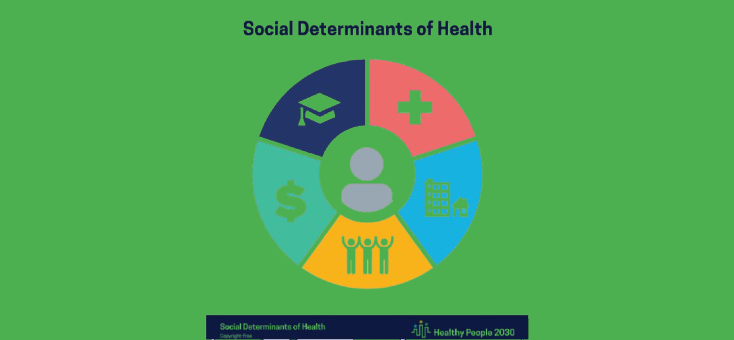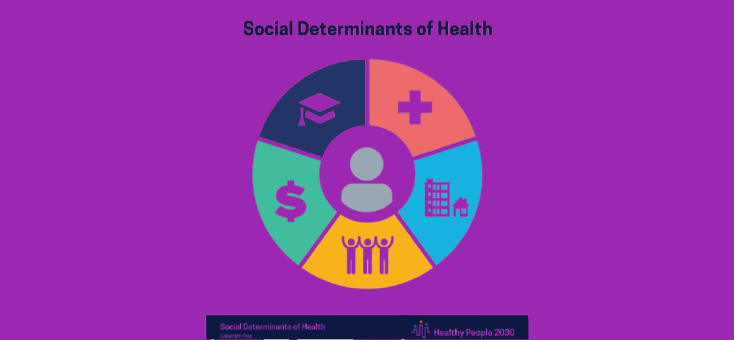In recent years, Social Determinants the conversation surrounding public health has shifted from focusing solely on medical care to exploring the broader factors that influence our well-being. Among these factors, the social determinants of health have garnered significant attention. Social Determinants of Public Well-being But what exactly are (SDOH), and why are they so crucial to achieving health equity?
Social Determinants of Health: Why They Matter

Health is often perceived as a matter of personal responsibility. We are taught to eat well, exercise regularly, and visit doctors for checkups. However, health is far more complex than personal choices alone. The conditions in which people are born, grow, live, work, and age—referred to as social determinants of health (SDOH)—play a critical role in shaping overall health outcomes. These social, economic, and environmental factors are as crucial to our well-being as genetics or medical care.
The World Health Organization (WHO) defines social determinants of health as “the non-medical factors that influence health outcomes.” These determinants include:
Economic Stability
Income level, employment status, and financial security influence one’s access to nutritious food, healthcare, housing, and education—all of which are key to health.
Education
Access to quality education impacts health literacy, job opportunities, and long-term health. Those with higher levels of education tend to live healthier, longer lives.
Healthcare Access and Quality
Geographic location, cost, and the quality of healthcare services can determine how well someone is able to manage illness, maintain preventive care, and access specialists.
Neighborhood and Built Environment
Where a person lives—whether it’s in a rural area, urban center, or a neighborhood with high crime rates—affects safety, access to grocery stores, recreational spaces, and exposure to pollution.
Social and Community Context
Relationships and social interactions, including discrimination and community support, can either positively or negatively influence physical and mental health.
Why Are Social Determinants of Health Important?

Understanding and addressing social determinants of health is key to improving health equity. Certain populations, such as those living in poverty, marginalized communities, or rural areas, face systemic barriers that can lead to poorer health outcomes. For instance:
Income Disparities
People with lower incomes are less likely to access preventive healthcare services, nutritious food, and safe living environments, leading to higher rates of chronic illness and lower life expectancy.
Educational Inequality
Those with limited education may struggle to navigate healthcare systems, understand medical advice, or afford quality care, putting them at a disadvantage in managing their health.
Racial and Ethnic Disparities
Minority populations often face discrimination in healthcare settings, leading to delayed diagnoses, substandard care, or even mistrust of healthcare providers.
Addressing these determinants can lead to a healthier, more equitable society where people’s health outcomes are less determined by their social circumstances and more by their personal choices.
How Social Determinants Shape Health Outcomes
Social determinants of interact in complex ways, leading to diverse health outcomes within different populations. For example, someone who lives in a low-income neighborhood may experience multiple barriers to maintaining good health: limited access to nutritious food, unsafe housing, or exposure to environmental pollutants. This can lead to higher rates of chronic diseases like diabetes, cardiovascular issues, or respiratory problems. In contrast, individuals from wealthier areas often have better access to healthcare, healthier food options, and safer environments, contributing to longer life expectancy and better quality of life.
The Role of Healthcare Providers and Policymakers
Healthcare providers and policymakers have a significant role to play in addressing social determinants of health:
Integrating Social Care into Healthcare
Healthcare systems can incorporate screenings for social factors like food insecurity, housing instability, and transportation challenges. By addressing these issues early on, healthcare providers can connect patients with community resources that can improve their overall well-being.
Community Health Programs
Initiatives like affordable housing projects, community gardens, or literacy programs can address the broader social needs of a population. Such programs not only improve the immediate environment but also reduce long-term healthcare costs by fostering healthier communities.
Policy Reforms
Policymakers can drive significant change by implementing policies that ensure affordable healthcare, improve education, increase the minimum wage, and invest in underserved neighborhoods. These reforms create long-term, sustainable improvements in population health.
Conclusion
The social determinants of illustrate that health is shaped by more than just biology or personal behavior. Addressing the broader social, economic, and environmental factors that impact health is critical for achieving health equity. Through collaborative efforts among healthcare providers, policymakers, and communities, we can create environments that allow everyone to live healthier, fuller lives—regardless of their background or social status.



